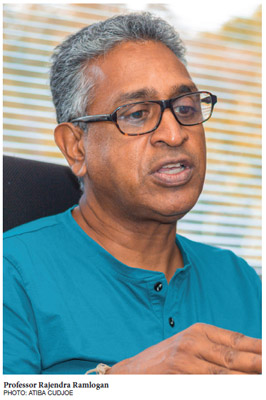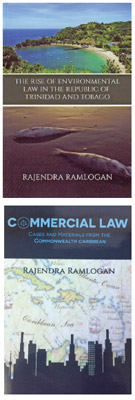
  A legal scholar in UWI St Augustine’s Department of Management Studies in the Faculty of Social Sciences has published two books that “recognise the jurisprudential triumphs and travails of the Caribbean people in their own voices”. A legal scholar in UWI St Augustine’s Department of Management Studies in the Faculty of Social Sciences has published two books that “recognise the jurisprudential triumphs and travails of the Caribbean people in their own voices”.
Rajendra Ramlogan, Professor of Commercial and Environmental Law, says he wrote the books in part to help citizens of Trinidad and Tobago as well as the region, “develop faith and confidence in our jurisprudence and what we are capable of doing.”
Commercial Law: Cases and Materials from the Commonwealth Caribbean, tells the story of how the region’s legal system developed to address commercial legal principles. The other book, The Rise of Environmental Law in the Republic of Trinidad and Tobago, looks at the evolution of environmental law from 2001 to January 2019. They were launched in April at a gathering on the St Augustine Campus that was well attended by academics, legal luminaries, commercial and environmental specialists, and friends and family.
Speaking at the launch, Justice Winston Anderson of the Caribbean Court of Justice said The Rise of Environmental Law, “after nearly 60 years of organised legal education in the Caribbean, it remains the case that far too often our legal discourse has been conducted through the British writers of legal texts. These texts have served us well in constructing a solid foundation for a stable and sound Caribbean jurisprudence. But it is time we honour that past by recognising the jurisprudential triumphs and travails of the Caribbean people in their own voices.”
The books, said Professor Ramlogan, were written in honour of the Management Society of The UWI at St Augustine Trinidad and Tobago and all proceeds go to the society. Monies generated from sales have already been allocated to provide partial funding for a week-long student study trip to the Stetson University School of Business Administration in Florida, USA.
“I see it as a way of giving back to the students,” Ramlogan says.
He sees the recording of Caribbean jurisprudence, as was done in his books, as important not just for the legal profession, but for the society as a whole:
“The essence of society is our adherence to law, our willingness to follow rules. And rules must be defined. Rules must give us hope that our society is operating in a manner that we can feel confident in a given situation to predict what will happen based on the principles that have emerged. I feel strongly that very few societies have emerged successfully where we have not adhered to some sort of rule of law doctrine.”
|





